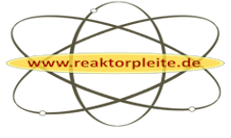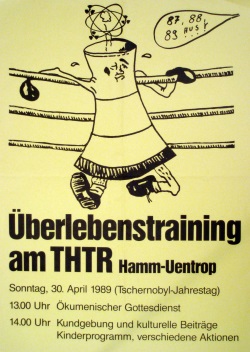13 Apr 2015
Castor transports from Jülich to the USA finally off the table?
Ahaus is also not an option for Jülich nuclear waste!
Nuclear power opponents from Jülich, the Münsterland and the entire federal territory are unanimous: They demand that the 152 castors remain in a safe camp in Jülich. Neither the US nor Ahaus are sensible options for the 300.000 fuel element balls!
German ministries doubt the USA option and US authorities postpone environmental impact assessments several times
With regard to the export plans to the USA, the anti-nuclear power initiatives have now been confirmed: Their doubts about the legal implementation of the Castor exports, which they had backed up with two legal reports in September 2014, are now apparently from some employees, according to media reports shared by the relevant ministries.
"Through our contacts in the USA, we know that the publication of the environmental impact assessment there for the acceptance of the castors has now been postponed a third time," explains Marita Boslar from Jülich. However, this deferral tactic does not solve the nuclear waste problem; Years of sitting out in Jülich have already shown this.
Ahaus as plan B does not bring any security gain
The opponents of nuclear power are concerned, however, that the Castor transports from Jülich to Ahaus are now being favored. Ahaus is not like Jülich without a permit, but it is also not protected against plane crashes and terrorist attacks.
"In Ahaus there are no possibilities to repair or reload damaged castors, but in Jülich there are, because the castors were loaded there in the hot cells," explains Felix Ruwe from BI-Ahaus
From the Ahaus interim storage facility, the fuel element balls cannot simply be sent to a nuclear waste storage facility that has yet to be found. Before that, they would have to be conditioned again, i.e. processed and repackaged - presumably again in Jülich. “This means that the Castor transports from Jülich to Ahaus violate the red-green coalition agreement; it says that the fuel elements should only be transported once to a 'repository' ”, says Felix Ruwe.
Castor transports on NRW highways pose a risk for everyone
152 Castoren would have to be brought from Jülich to Ahaus via the highways in North Rhine-Westphalia. "The Castor transports from Jülich to Ahaus bring additional transport risks for countless people along the way, but no progress in the nuclear waste dilemma," says Michael Harengerd from BUND NRW. "In the past, with the Autobahn Action Day, we have shown how well the resistance between Jülich and Ahaus is networked - and we will not wait with the protests until the Castors in Ahaus are at the door," continues Michael Harengerd.
The anti-nuclear initiatives will continue to work closely together and follow every step of the research center and the relevant ministries and authorities. "Together we will stand across if the Castors should leave Jülich - no matter where".
Contacts for queries:
Michael Harengerd (BUND NRW): 0175-56574 90
Marita Boslar (Action Alliance Westcastor Jülich): 0171-7642267
Felix Ruwe (BI Ahaus): 02561-6577
*
Further to: Newspaper article 2015
***
Top |
***
Donation appeal- The THTR-Rundbrief is published by 'BI Umwelt Hamm e. V. ' - Postfach 1242 - 59002 Hamm and financed by donations. - The THTR circular has meanwhile become a much-noticed information medium. However, there are ongoing costs due to the expansion of the website and the printing of additional information sheets. - The THTR circular researches and reports in detail. In order for us to be able to do that, we depend on donations. We are happy about every donation! Donations account:BI Umweltschutz Hamm |
***
Top |
***



